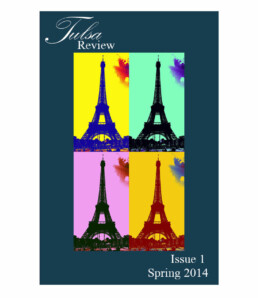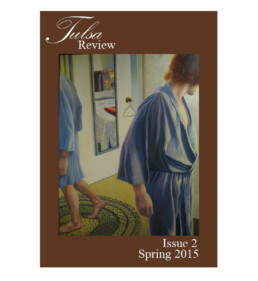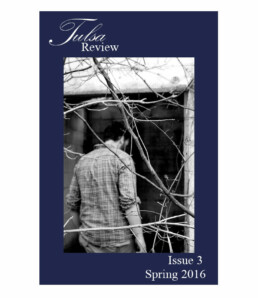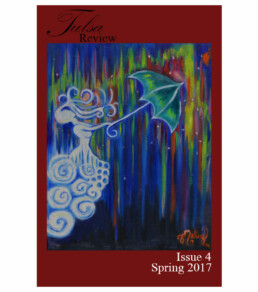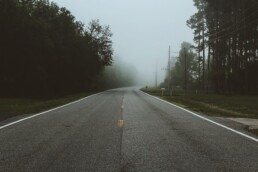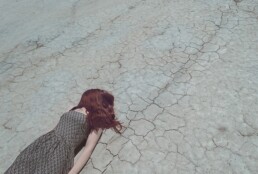2014 Issue 1
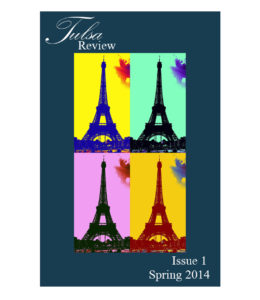
2014 Issue
Contents
Masthead
Josh Parish | Managing Editor
Kelly Edwards | Art Editor
Corey Jenkins | Associate Editor
Hannah McCage | Associate Editor
Chris Walder | Associate Editor
Advisory Committee
Mary Cantrell (Southeast Campus)
Allen Culpepper (Southeast Campus)
Sloan Davis (Northeast Campus)
Kasty France (Southeast Campus)
Carol Johnson (Southeast Campus)
Josh Parish (Metro Campus)
Sarah Stecher (Metro Campus)
Paul Zintgraff (Metro Campus)
Annie Matthews | Logo Design
Images in this issue by Kelly Edwards, Greg Stone (“Church People Like to Touch You”), and under free license from morguefile.com. Tulsa skyline slider copyright Caleb Long, via Wikimedia Commons.
Contact us:
Tulsa Review, c/o Tulsa Community College
Communications Division Rm. MC-423
909 S. Boston | Tulsa, OK | 74119
(918) 595-7244
2015 Issue 2
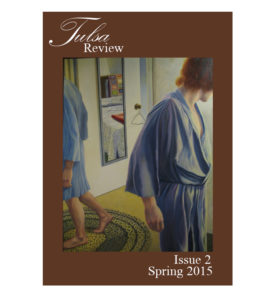
2015 Issue
Contents
Masthead
Managing Editor
Sloan Davis
Poetry Editor
Matthew Dorr
Prose Editor
Maurie Traylor
Web Designer & Art Editor
Thee Yang
Advisory Committee
Mary Cantrell (Southeast Campus)
Allen Culpepper (Southeast Campus)
Sloan Davis (Northeast Campus)
Kasty France (Southeast Campus)
Carol Johnson (Southeast Campus)
Josh Parish (Metro Campus)
Jeanne Urie (Metro Campus)
Contact us
Tulsa Review, c/o Tulsa Community College
Communications Division, Rm. NE-2389
3727 E. Apache
Tulsa, OK 74115
tulsaccreview@gmail.com
2016 Issue 3
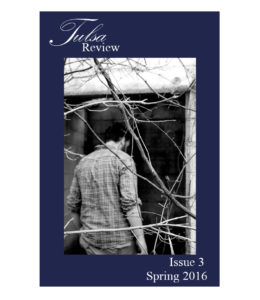
2016 Issue
Contents
Masthead
Allen Culpepper/Managing Editor
Dejah Henson/Submissions Manager
Rachel Keith/Executive Editor
Natalie Kendrick/Fiction Editor
Kristen Lowe/Poetry Editor
Toronzo McInnis/Marketing & Outreach Director
Briann Piguet/Non-fiction Editor
Destiny Pricer/Art Editor
Benjamin Gennetay/ Web Editor and Design Director
[divider style="solid" height="1px" color="#e8e8e8"]
Advisory Committee
Mary Cantrell (Southeast Campus), Allen Culpepper (Southeast Campus), Sloan Davis (Northeast Campus), Kasty France (Southeast Campus), Carol Johnson (Southeast Campus), Josh Parish (Metro Campus), Sarah Stecher (Metro Campus), and Paul Zintgraff (Metro Campus)
Tulsa Review Logo | Annie Matthews
Masthead art (birds)/Maurie Traylor
[divider style="solid" height="1px" color="#e8e8e8"]
Acknowledgements for 2016 issue
The Tulsa Community College Foundation for its generous funding of our contest prizes
Southeast Campus Student Life for funding our launch party
Poetry Judges: Josh Parish, Sarah Stecher, Jeanne Urie
Art Judges: Lyndel Colglazier, Ted Holland, Angela Summers
Prose Judges: Sloan Davis, Kasty France, Carol Johnson
Southeast Campus Student Life Staff
Southeast Campus Provost's Office, especially Sally Mondragon
Southeast Campus Police
The English and Speech Faculty and Communications/Liberal Arts Administration and Staff at Metro, Northeast, Southeast, and West Campuses, especially Michelle Dixon and Mary Steinsiek
Previous Managing Editors Sloan Davis and Josh Parish
Student Affairs Administration and Staff, especially Jan Clayton and Denise Baldwin
TCC Foundation Administration and Staff, especially Lauren Brookey and Tammy Upshaw
Ken Wood and Johansen Quijano for staff-recruitment assistance
Thee Yang Xiong for social-media assistance
Southeast Campus Facilities staff for room set-up for launch party
Matt Edwards/Southeast Instructional Technology for audio and projection at launch party
TCC Marketing Department for promotional fliers
TCC-Southeast Print Shop
Beth Thompson for use of easels for art winners
And everyone who shared their poetry, stories, essays, and artwork with us
[divider style="solid" height="1px" color="#e8e8e8"]
Contact us:
Tulsa Review, c/o Tulsa Community College
Communications Division Rm. SE-1202
10300 E. 81st St.| Tulsa, OK | 74133-4513
(918) 595-7647
2017 Issue 4
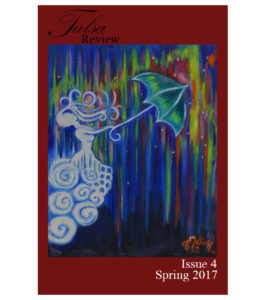
2017 Issue
Contents
Masthead
Managing Editor
Josh Parish
Executive Editors
Briann Piguet
Ryan Riley
Poetry Editors
Kaylie Cotten
Andrea Miller
Elizabeth Ray
Prose Editors
Rebekah Michael
Elizabeth Young
Webmaster & Logo Design
Jason Oehlberg
Advisory Committee
Mary Cantrell (Southeast Campus)
Allen Culpepper (Southeast Campus)
Sloan Davis (Northeast Campus)
Kasty France (Southeast Campus)
Carol Johnson (Southeast Campus)
Josh Parish (Metro Campus)
Jeanne Urie (Metro Campus)
Contact us
Tulsa Review, c/o Tulsa Community College
School of Liberal Arts and Communications, MC-423
909 S. Boston Ave.
Tulsa, OK 74119
tulsaccreview@gmail.com
Letter from the Editor
You’ve probably heard that truth and the Internet are having relationship troubles right now. Fake news. Alternative facts. Sometimes, part of me thinks that maybe there are just too many people writing—that of all the voices on the stage, the loudest, dumbest ones always seem to get the most attention. Maybe.
When I started to college, I loved a short poem by E.B. White that I found in a book borrowed from a friend. Back then, this was still the usual way for a person to discover a poem by a dead person: in a book, that is, possibly even an edition proofread by the actual author, rather than online. The poem goes like this:
The critic leaves at curtain fall
To find, in starting to review it,
He scarcely saw the play at all
For watching his reaction to it.
At a time when I was being asked by some professors to do just such awful things to literature—criticize it, evaluate it, tie it to a chair and torture a confession out if it, as Billy Collins said—the poem seemed like good medicine to remember. The final line, especially, gives a concrete explanation why the critic has missed the point: he’s jumped over the experience of the play and landed in the muck of himself. It offers some nuanced instruction. Dangerous curves ahead, writer or reader, should you find yourself watching you when you ought to be experiencing the show.
I regret to report that the Internet has now killed this poem. Search for it online and you’ll see what I mean. At some point, a sleepy or lazy writer must have mistyped the last line by repeating the second line, and then uploaded the error to a website that collects quotations. Other websites obviously copied the sleepy writer’s version and reprinted it, so the first page of Google results for the poem shows link after link to this ugly thing, attributed to White:
The critic leaves at curtain fall
To find, in starting to review it,
He scarcely saw the play at all
For starting to review it.
Letting alone that the meter is now all screwed up, gone is the nuanced truth originally expressed in that final line. In its place are a clunky ending and a cruder insight: reviewing stuff, maybe even just thinking about stuff, is stupid. Judging by the number of people who have created inspirational memes (with the botched poem in block text over pastel backgrounds or soft-focus sunsets), this insight obviously resonates in some way. I don’t disparage people for finding some truth there. But it’s not E.B. White’s truth. It’s not E.B. White’s poem. And it’s sad to me to think these readers will only love the fraudulent version, never suspecting a much better ending ever existed. The truth has been trampled all over the place. The Internet can do that, sometimes.
But then there are places like our journal. These are quieter places, in the dark little corners of the Internet, without a dozen ads on every page or clickbait appealing to your lizard brain. There are many writers’ voices in this issue, too, but they have a different effect on the truth. They magnify it, rather than diminish it. You won’t find one “type” of writer here: young, old, experimental, traditional, etc. You also won’t find a recurring theme, unless it’s by coincidence; we didn’t set out to create one.
Read this issue and you’ll discover how big changes in life and love can come during the smallest moments, over breakfast sausage or with a toothbrush in one’s mouth. You’ll meet a wife who takes revenge on her abusive husband, and a son who finds a strange moment of communion with his father. You’ll travel to Berlin, to Florence, to Idaho, and to Highway 169. A bunch of different voices come together here, and the result is more truth, not less. More angles of its reflection. Real news.
A bunch of different people helped create this issue, too, and I need to thank them. First, the Tulsa Community College Foundation, for funding our contest prizes and launch party, and Metro Campus Provost Dr. Greg Stone, for funding the launch party as well. The planning and acquisition of supplies couldn’t have been done without major help from Margaret Harrison, Executive Assistant in the Metro Provost’s office. Our contest wouldn’t have been possible without the hard work of the already hard working TCC creative writing faculty, who judged the prose and poetry entries: Mary Cantrell, Dr. Allen Culpepper, Sloan Davis, Kasty France, Carol Johnson, and Jeanne Urie. Likewise, Dr. John Gibson and Dr. Greg Stone took time from their busy schedules to judge the visual art entries. Amy Rains from the Metro Writing Center was wonderful to work with as she and others selected poems from our submissions, now stenciled on downtown Tulsa sidewalks, for the Writing Centers Rain Poetry Project. Julie Luscomb, Associate Professor of Information Technology at the Southeast campus, was equally wonderful to work with in helping us to find our Webmaster from among her students.
Most importantly, thank you to the students who volunteered their time on our editorial staff. They selected all of the writing, outside of the contest winners, that you’re about to read: Executive Editors Ryan Riley and Briann Piguet; Poetry Editors Kaylie Cotten, Andrea Miller, and Elizabeth Ray; and Prose Editors Rebekah Michael and Elizabeth Young. A huge thank you to Jason Oehlberg, our Webmaster, for having spent countless hours overhauling our site, archiving past issues, and updating our logo. He’ll be on the job market soon, and someone will be wise to hire him.
Finally, thank you to all the writers and artists who submitted their work for our consideration.
There aren’t too many people writing. You just have to look a little harder for the truth. Now, read the issue, and enjoy the show.
Josh Parish
Assistant Professor of English
Managing Editor, 2017 Tulsa Review
About Not Really Being Responsible
by John Gray
My age is my mitigating circumstance.
As the witnesses to my life decrease in number,
and less dispute of my memories.
My account of how it happened erupts from
daily recreations of myself,
and my truisms aren’t always false.
At those moments when I ride the clean edge
I am frightened by small truths,
But, generally, I no longer wish to be held responsible.
The more I learn the less I fear the wrath
of contradiction.
Events are swiftly and conveniently forgotten by
a turning of the head,
leaving most puzzles unsolved.
There are no fewer mysteries due to my presence,
But, I take modest satisfaction in tapping my own
dance and making my singular mark.
As I age, my mark fades and I recognize the purpose
Of my life is to reconcile me to its eventual loss.
Great Again
by T. Allen Culpepper
The terrorism of the autocrat
deploys no bombs homemade
from pipes or pressure-cookers,
but, even if bloodless, wounds
the souls of the people, of the
nation, left to exist in pain
or limbo, but deprived of the
rights that make existence life.
It punishes, excludes, runs
backward over progress
and flattens it, drives it
underground. And it lays
a pipeline, a conduit of
hatred and alienation, and
becomes itself the pressure-
cooker, screwing down
the lid that will fly off
across the kitchen when
the anger and fear explode,
breaking the country apart,
glorifying the tyrants
of economic oppression,
burdening those already
kicked in the face, deflated
by the persistent absence
of opportunity. And the
seekers—of asylum,
of settlement, of peace,
will be turned empty
away from the country
that immigrants built
over the graveyards
of the indigenous,
further denigrating
their martyrdom. The
nation that has grown
rich through the
proud exploitation
of its natives, its
incomers, its underclasses
and exiles, but now
refuses to share. If
greatness rests on hatred,
on discrimination and
exclusion, on ignorance
and misunderstanding,
the great again seems
less noble.
169 North
by Jonathan McGuire
That endless river of soaked cement
Whose fading facial scars could eat a tire
Who stretches out infinitely in the pale moon's light
That opaque ocean of asphalt
Whose arrhythmic contractions open up the earth
Who looks to the night sky to keep on the bright side
That huddled mass of marketable machines
Whose movements mirror a massive beehive
Who navigate through the honeycomb's hallways
That beautiful green Messiah
Whose mission is to shepherd the refugees
Who shakes off reality and shoves responsibility down a gaping mouth
Mistakes
by Myleena (John) Sevin
I barreled over on the pavement, laid flat,
scraped my knees to hell and back,
hands torn to pieces with rock bits.
Stifled my cries under weights of shame; it’s
crashing from being so high that hurts,
I thought I was mighty once, my exerts—
Could not be lowered by a crutch.
I climbed so high and it hurt so much.
There was a burning under my skin
beyond a cut or tear, searing of flesh; in
struggling to hold my blood in, to drag,
screaming behind my arms to gag
the fact that I’d gone down and lost more—
Than I gave; to avoid all where I was sore,
Ugly face with the dirt shoved between—
My slivers of skin, the rips in my shirt; unclean,
locked on the ground when I was eighteen.
Self Discovery
by Haleigh Gaines
E=mc².
The mitochondrion is the powerhouse of the cell.
I know much about a lot,
But little about myself.
Do I like equations?
Microscopes and protractors?
Do I love essays and reading?
In preschool, they teach you that you do.
That you love phonics and counting and your friends and emotions.
But then in middle school you hate learning and emotions, because it's cool.
And in high school you love to hate because it's cool.
But later you miss it.
Then you go to college.
You’re happy, right?
Ready to soar to a new height.
But you must pick a major.
What do you like?
What do I like?
Science, Math, English?
Do I have a longtime dream I wish to achieve?
All I remember is working hard because I had to.
Now I get to choose my work, but why am I sad to?
Why am I confused?
Have I been abused?
By a school system that taught me nothing of me?
How could they teach everything but how to live with myself?
Were they wrong, or am I?
Should I have expected my teachers to teach me about myself?
How could they? Even I don’t know myself.
But couldn’t they have taught me how to learn about myself
So I don’t discern my self-worth from somewhere else?
Now I am searching for myself everywhere and nowhere.
In microscopes and textbooks.
In the library and classrooms.
In a major I’m unsure of.
In my brain, instead of my heart.
In a vague plan for my life,
I’m still searching for meaning.
I wish I could look inside of my soul,
Like I do with cells,
And know the parts and pieces of myself.
Capsula Mundi
by Micah Clopton
www.capsulamundi.it/en/
Even at age 33, one can think about a burial.
As for me, I’ll be a pod for a tree to grow up into his grave.
Imagine a man, fetal in sac, to feed the world, not after.
But from among his visceral stuff;
Planted like a tree by a stream of Eden.
In due season, these leaves will yield
Familial fruit in the forested midst of my peers.
Ah, to be the buried red pulp of a green olive for the gods!
Seething dryad egg, a living seed, to be the branches
From which to hang a swing, or nest the sparrow:
Branches, to jettison the sunset’s energy.
Sic transit Gloria mundi! Glory container?
Withal desire to be shorn of life’s coverings,
And be born again as a sycamore tree, literally.

